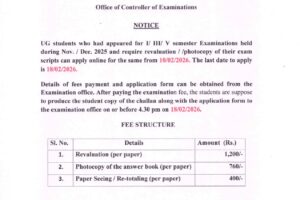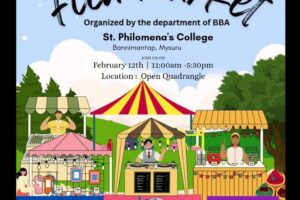
Report on Industrial visit to “ICAR – Chettalli Horticultural Experiment Station (CHES)”

DEPARTMENT OF BOTANY ORGANIZED
An Industrial visit to
“ICAR – Chettalli Horticultural Experiment Station (CHES)”
Held on 24th June 2022
PREAMBLE
Instrumentation is an important aspect when we talk about Biotechnology and Genetic engineering. Instruments like laminar air flow, autoclave are necessary part of tissue culture; whereas PCR, gel electrophoresis, docking machinery and software are important elements in genetic engineering.
Quite often, we disregard practical approach and focus on theoretical facet. Learning various instruments act as added advantage for any molecular biology laboratories. Isolation of DNA and designing primers are first step of isolating desired gene. This is where PCR comes into picture. Further the obtained DNA fragments are run on gel electrophoresis to obtain pure fraction of DNA. Further using molecular docking, it gives an insight to various biological processes.
Furthermore, grafting is one of the interesting processes in vegetative propagation. It serves as a technique to repair injured trees, to produce dwarf trees and shrubs and to strengthen plant’s defence towards diseases. This array of application makes it essential to learn about the same.
OBJECTIVES
- To practically understand various instrumentation.
- To have an insight of various exotic and horticulturally important plants in CHES.
- To develop skill in varied grafting techniques.
ABOUT THE INDUSTRY
This station situated in Kodagu district of Karnataka was transferred to IIHR from the Govt. of Karnataka with effect from February 1, 1972. Occupying an area of 92 hac. The Mandate crop of the station has been Coorg mandarin with major emphasis on citrus die-back. The station also works on fruit crops like papaya, passion fruit, minor fruits like, rambutan, pummelo, avocado, mangosteen, karonda, Malayan apple, Garcinia etc., and of late has diversified into floricultural crops like rose, asters, gladiolus, orchids. The station has a strong nursery unit for production and supply of disease free citrus planting material, other plant materials and Trichoderma cultures. Central Horticultural Experiment Station, Chettalli (District- Kodagu, Karnataka) is a regional station of Indian Institute of Horticultural Research (IIHR), Bangalore under Indian Council of Agricultural Research (ICAR), New Delhi. The Centre was started as orange research Centre in 1947 by erstwhile state government of Coorg. The Centre was transferred to IIHR in on 1st February 1972.

ABOUT THE INDUSTRIAL VISIT
Industrial visit is a part of curriculum, so the students were taken to CHES to gain the practical knowledge on industrial practices. We were accompanied by Dr. Madhu G. S, he guided us through the department of plant pathology of the CHES unit. He explained that they are working on avocado diseases, specifically Fusarium sps. He briefly explained various instruments used in molecular docking of Fusarium DNA isolated using a specific protocol. He explicated the process and idea of developing DNA primer. Furthermore he explained the working of PCR, gel electrophoresis and docking instrument as well as the software used. He built us an insight of tissue culture techniques various media used and instrument like laminar air flow.

The next session was taken over by Dr. Muralidhara B. M. He presented, using power point, various exotic and horticulturally important species that are grown in CHES. Some of them are Coorg mandarin, papaya, passion fruit, rambutan, pummelo, avocado, mangosteen, karonda, Malayan apple, Garcinia etc., also various floriculturally important plants like, rose, asters, gladiolus and orchids. He also briefed us about the importance of nursery in producing disease free varieties along with the production of Trichoderma cultures. He also explained the germplasm preservation unit of CHES which has more than 2000 germplasm preserved. It was an informative session as many of us did not know various exotic varieties and its importance.


Further, Mr. Giriraj led the students on a field visit where they could explore the nursery, grafting, variety of plants grown in CHES. He explained various methods of gardening and nursery management techniques. The students were intrigued by tissue cultured pepper plants. The students could perceive different types of avocado and appreciate Rambutan field. Overall, students could appreciate the industry and the quality of research that is been conducted.






OUTCOME OF THE INDUSTRIAL VISIT
- Students could practically understand various instrumentation.
- Students gained an insight of various exotic and horticulturally important plants in CHES.
- Students have developed the skill in varied grafting techniques.
FEEDBACK
Students were allowed to visit plant pathology laboratory where they learnt the methodologies of molecular docking and gained practical knowledge. They were excited to visit the farm and nurseries and developed the techniques of grafting of plants.


